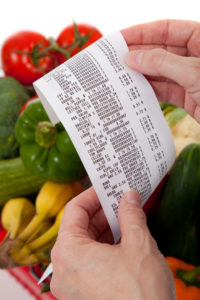By: Doris Vallejo-Aguilar, UT Intern, Spring 2017
You might think it is hard to eat healthy when you do not have a lot of money. Sadly, when people think this way, they pick up unhealthy nutritional habits. There is a way, however, to be healthy on a budget!
Before you go to the grocery store, check to see what you have in your pantry or refrigerator. This helps you figure out what you need to buy. Also, take the time to plan family meals. This will also help you make a list of the foods you need to buy. If you look at your schedule, figure out what easy meals you can make on the busiest days of the week.

Image source: Flicker (USDA, CC BY 2.0)
Another way to save at the store is by using coupons. When you select coupons, look at coupons for items you will use. If you have a tight budget but want to try new healthy foods, take advantage of coupons! Also, check out deals throughout the store. Did you know stores like to put the expensive items at eye level? Look at the items on high and low shelves for deals too!
According to MyPlate, you need to make half of your plate fruits and vegetables. When you buy fruits and vegetables that are in-season, they are less expensive and are at their peak flavor. Eating fruits and vegetables fresh, however, is not the only option.
Did you know the benefits of canned and frozen fruits and vegetables? People believe canned and frozen fruits and vegetables do not have all the nutritional value compared to fresh produce. However, canned or frozen fruits and vegetables may actually have higher nutritional value because they are processed soon after harvesting. Canned and frozen fruits and vegetables also last longer and are quick to put in your meals when you do not have time to eat or get fresh produce. This allows you to incorporate more fruits and vegetables in your meals. Consider buying canned or frozen fruits and vegetables today!
Check out Smart Shopping for Veggies and Fruits: https://www.myplate.gov/eat-healthy/healthy-eating-budget/shop-smart

Image source: Academy of Nutrition and Dietetics
It can be especially difficult for families who have low incomes to be healthy on a budget. When families do not have good nutrition, this can affect their health and delay development and learning. Fortunately, there are programs that help low-income families maintain good nutrition.
Become familiar with the Supplemental Nutrition Assistance Program (SNAP). SNAP provides monthly assistance to buy foods such as fruits, vegetables, bread, cereal, poultry, milk, and meat.
Families, who have children under the age of five, check out the Supplemental Nutrition Program for Women, Infants and Children (WIC). WIC provides food, health care information, nutrition education, and promotes breast-feeding to low-income women and children who are at risk for poor nutrition.
Take advantage of school meals too! Children are given free or reduced cost breakfast and lunch at school, depending on the family’s income level. The Healthy Hunger-Free Kids Act of 2010 ensures that school meals are healthier by serving low-fat diary, whole grains, fruits and vegetables, and lean meats.
Remember, look for deals throughout the stores and use coupons! Consider frozen or canned fruits and vegetables. Finally, become familiar with assistance programs you qualify for! All of these tips help you manage your food and be healthy on a budget.

